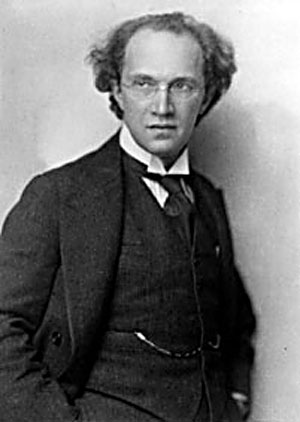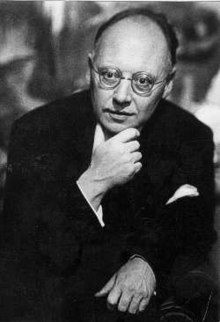This Week in Classical Music: March 23, 2020.Schreker and Petri.Two 20th century composers were born this week: Béla Bartók, one of the most interesting composers of the first half of the century, and Pierre Boulez, who influenced many during the second half of it.Bartók was born March 25th of 1881, Boulez – on March 26th of 1925.Another composer, now almost forgotten but at his time quite famous, Franz Schreker, was born on this day in 1878 in Monaco, where his father, an itinerant court photographer – a profession possible only in the late 19th century – was working at the time. Schreker, an Austrian, became prominent in Vienna as an opera composer: one music critic even compared him with Wagner; at the peak of his career, in early 1920s, he was one of the most celebrated composers in German-language lands.Things changed dramatically in the late 1920s:two of his operas premiers were unsuccessful, then the financial crisis put pressure on all opera houses, later the right-wingers and the Nazis forced cancellations of many performances of his music (Schreker’s father, the court photographer, happened to be Jewish), and when the Nazis came to power Schreker was forced to resign all his positions.In December of 1933 he suffered a stroke and died in Berlin on March 21st of 1934, two days before his 56th birthday.Here’s his Kammersymphonie composed during WWI, in 1916.It’s performed live by the Saint Paul Chamber Orchestra with Edo de Waart conducting.
The German pianist Egon Petri was also born on this day, in 1881 in Hanover.As a child he studied violin and the piano, and later the organ and the horn.It was the classes with Ferruccio Busoni that convinced young Petri that the piano was his instrument.Petri later worked as Busoni’s assistant and generally considered himself his disciple rather than his student.Under Busoni’s influence Petri immersed himself into Bach’s music, not only performing it but also editing, with Busoni, the 25-volume edition of Bach’s clavier compositions.In 1923 he became the first foreign musician to tour the Soviet Union; his success there was tremendous.In the late 1920s Petri moved to Zakopane, Poland, where he established a music school.He escaped when Germany invaded Poland at the beginning of WWII and eventually settled in the US.He taught at Cornell first, and then settled in California where he became famous as a pedagogue.Petri refused to play in Germany and never did.He died in Berkeley on May 27th of 1962.Here is a 1942 recording of Petri playing four of Bach’s chorale preludes, arranged for the piano by Busoni.
Schreker and Petri, 2020
This Week in Classical Music: March 23, 2020. Schreker and Petri. Two 20th century composers were born this week: Béla Bartók, one of the most interesting composers of the first half of the century, and Pierre Boulez, who influenced many during the second half of it. Bartók was born March 25th of 1881, Boulez – on March 26th of 1925. Another composer, now almost forgotten but at his time quite famous, Franz Schreker, was born on this day in 1878 in Monaco, where his father, an itinerant court photographer – a profession possible only in the late 19th century – was working at the time. Schreker, an Austrian, became prominent in Vienna as an opera composer: one music critic even compared him with Wagner; at the peak of his career, in early 1920s, he was one of the most celebrated composers in German-language lands. Things changed dramatically in the late 1920s: two of his operas premiers were unsuccessful, then the financial crisis put pressure on all opera houses, later the right-wingers and the Nazis forced cancellations of many performances of his music (Schreker’s father, the court photographer, happened to be Jewish), and when the Nazis came to power Schreker was forced to resign all his positions. In December of 1933 he suffered a stroke and died in Berlin on March 21st of 1934, two days before his 56th birthday. Here’s his Kammersymphonie composed during WWI, in 1916. It’s performed live by the Saint Paul Chamber Orchestra with Edo de Waart conducting.
forgotten but at his time quite famous, Franz Schreker, was born on this day in 1878 in Monaco, where his father, an itinerant court photographer – a profession possible only in the late 19th century – was working at the time. Schreker, an Austrian, became prominent in Vienna as an opera composer: one music critic even compared him with Wagner; at the peak of his career, in early 1920s, he was one of the most celebrated composers in German-language lands. Things changed dramatically in the late 1920s: two of his operas premiers were unsuccessful, then the financial crisis put pressure on all opera houses, later the right-wingers and the Nazis forced cancellations of many performances of his music (Schreker’s father, the court photographer, happened to be Jewish), and when the Nazis came to power Schreker was forced to resign all his positions. In December of 1933 he suffered a stroke and died in Berlin on March 21st of 1934, two days before his 56th birthday. Here’s his Kammersymphonie composed during WWI, in 1916. It’s performed live by the Saint Paul Chamber Orchestra with Edo de Waart conducting.
The German pianist Egon Petri was also born on this day, in 1881 in Hanover. As a child he studied violin and the piano, and later the organ and the horn. It was the classes with Ferruccio Busoni that convinced young Petri that the piano was his instrument. Petri later worked as Busoni’s assistant and generally considered himself his disciple rather than his student. Under Busoni’s influence Petri immersed himself into Bach’s music, not only performing it but also editing, with Busoni, the 25-volume edition of Bach’s clavier compositions. In 1923 he became the first foreign musician to tour the Soviet Union; his success there was tremendous. In the late 1920s Petri moved to Zakopane, Poland, where he established a music school. He escaped when Germany invaded Poland at the beginning of WWII and eventually settled in the US. He taught at Cornell first, and then settled in California where he became famous as a pedagogue. Petri refused to play in Germany and never did. He died in Berkeley on May 27th of 1962. Here is a 1942 recording of Petri playing four of Bach’s chorale preludes, arranged for the piano by Busoni.
Busoni that convinced young Petri that the piano was his instrument. Petri later worked as Busoni’s assistant and generally considered himself his disciple rather than his student. Under Busoni’s influence Petri immersed himself into Bach’s music, not only performing it but also editing, with Busoni, the 25-volume edition of Bach’s clavier compositions. In 1923 he became the first foreign musician to tour the Soviet Union; his success there was tremendous. In the late 1920s Petri moved to Zakopane, Poland, where he established a music school. He escaped when Germany invaded Poland at the beginning of WWII and eventually settled in the US. He taught at Cornell first, and then settled in California where he became famous as a pedagogue. Petri refused to play in Germany and never did. He died in Berkeley on May 27th of 1962. Here is a 1942 recording of Petri playing four of Bach’s chorale preludes, arranged for the piano by Busoni.